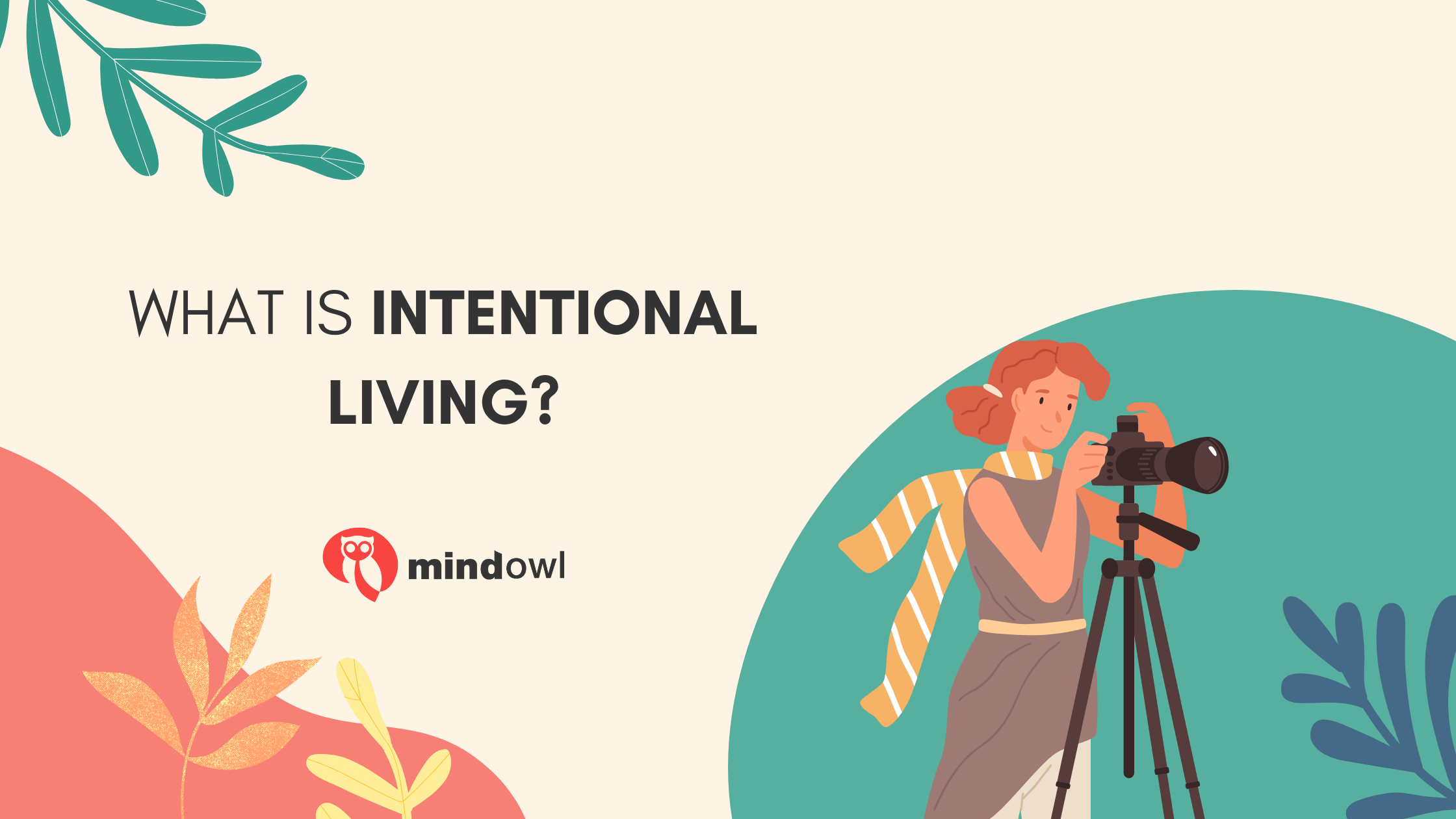In today’s hectic modern world, in which excess and selfishness are often encouraged, it can take great time and effort to develop a simple life based around your core values and needs. Our lives are full of personal and professional tasks that swallow up our energy and time, without giving us much in return. One way to combat these pressures is by adopting the principles of intentional living.
What does it mean to live your life with intention?
Intentional living is an increasingly popular lifestyle choice, but what exactly does it entail? Well, it’s simple really. Intentional living means being aware of one’s fundamental beliefs, and willingly making an effort to reflect these beliefs in one’s behaviour. It’s about being aware of who you are and what you want, and choosing to commit to attitudes and decisions which align with this self-image. This conscious living can connect us to a deeper, more purposeful part of ourselves.
Life on autopilot
Living intentionally means resisting the temptation to operate on autopilot. Each day, we take care of ordinary tasks without thinking about them, because our brains have developed an ‘unconscious decision-making system’ that controls much of our lives, without us even realising. However, this autopilot mode can cause us to make decisions that don’t benefit us. While autopilot allows our lives to run smoothly and safely, it can stop us from fully experiencing what’s really important. This can result in a loss of meaning, energy, and enthusiasm.
Modern society trains us to think that having and doing more is always the answer to finally feeling successful, but this is simply not the case. When you’re a busy person, you focus simply on keeping your head above the water, rather than asking yourself important questions like “Do I need to own a house?”, “Why am I working a 60 hour week?” or “Do I like being married?”. Intentional living is about countering this autopilot lifestyle by making daily decisions based on the things we care about. To do this, we must first set out a clear vision for ourselves.
What is your vision?
When attempting to take control of your own life, it is important to conduct some self-questioning. In order to establish your core values and vision, ask yourself:
- What do you want your life to be about?
- What are the things that matter most in life to you?
- What is important to you and why?
- How can you make this happen?
Knowing your core beliefs helps you make intentional choices during your daily life that will propel you in a positive direction.
How to identify values and beliefs
Values revolve around how you want to treat others and act on a day-to-day basis. Some common examples include acceptance, adventure, courage, equality, honesty, independence, or power. There is no such thing as right or wrong values; it’s a matter of personal preference which principles you find most important.
Below are some simple steps you can take to help identify your core beliefs.
Conduct a self-examination
Intentional living is about asking yourself why you do things and becoming happy with the answers. Here are some key questions to ask yourself:
- Why are your friends your friends?
- Why did you choose your career/job?
- Why did you buy [insert last purchase]?
- Why are you with your partner?
Note how your answers to these questions make you feel. Do they make sense, or are they contradictory or confusing? Was it difficult answering them at all? In order to become curious people who can make meaningful lifestyle changes, close self-examination is crucial.
Write down your core values
It can be difficult to identify your personal values, especially as they will often change with time. Therefore, you should take the time to sit down with a pen and paper and write down what you believe your core values are. This record can be used for future reference. Generally, we feel good when our actions align with our values, and we feel bad when we violate these beliefs. By recalling moments in which you’ve felt particularly happy or proud, you can identify what values you cherish most.
Think about who you admire and why
If you’re struggling to establish your core values, think about who you admire and consider the qualities those people have, rather than just simply focusing on yourself.
Use meditation to discover your true self
Value identification hinges on self-exploration. When considering what we want from life, our autopilot instincts can sometimes lead us to rely on cultural norms rather than our own personal needs and aspirations. Meditation can help us avoid this, by prompting slow, controlled investigation into how our minds work. This can create a better understanding of which responses are automatic or culturally influenced, and which genuinely resonate with our beliefs.
Intentional living doesn’t just mean having positive emotions
So what exactly does intentional living look like? A common misconception is that intentional living means avoiding negativity and only thinking positive thoughts. In fact, this goes against one of the fundamentals of both mindfulness and intentional living, the belief that pain and suffering is an essential part of human existence.
Accept pain
Intentional living is partly about rejecting the idea that pain should be suppressed or avoided at all costs. If we learn to accept it rather than trying to generate positive emotions all the time, pain can actually help reveal what is truly important to us.
An experience of mental pain is proof that we care about something. When someone we love dies, we may feel agonizing pain, understandably. However, if we consider that this pain indicates how much we love and care about that person, we can cultivate a more positive view of this experience. By embracing the pain of loss, we can try to turn our minds organically to more positive thoughts, rather than just suppressing suffering. This process is something our article on Pain vs. Suffering explores further.
How does this improve our relationships?
Unfortunately, in order to experience meaningful relationships with others, we also inevitably have to experience pain and sadness when these relationships end. Closing yourself off to others in order to avoid this kind of pain may seem like an option; however, a life without meaningful relationships is hardly a life at all.
Pleasant experiences of joy, love, and connection are the positive by-products of living in alignment with our values. However, this adherence to our values can also result in unpleasant by-products like sadness, pain, and suffering. Reflecting on different types of pain can allow us to consider which aspects of ourselves we need to work on to experience more meaningful lives.
When experiencing negative emotions, ask yourself this: What is this emotion trying to tell me? What personal value does this feeling most strongly relate to? Ultimately, the best feelings in life will often be accompanied by pain and difficulty. For example, parenting or elite sporting triumph can provide the most intense moments of meaning and happiness, but these moments will inevitably be preceded by months or years of painful struggle. We shouldn’t ignore the negative feelings that accompany these meaningful moments. In fact, they are just further proof of what is truly important to us.
You don’t have to have everything figured out
Establishing a purpose behind our actions will give us increased clarity and drive; however, intentional living does not mean having everything figured out.
Living intentionally isn’t necessarily about perfection, or having a 10-year plan which maps out every detail of your life. Remember: you can be intentional about your direction without knowing your final destination. You may have hesitations and make mistakes, and that’s okay.
While it’s important to realise that you don’t have to have everything figured out, what you do need to work out is your values. These can change daily, so try to reflect regularly on your beliefs and lifestyle choices, altering your life to align with them.
Ways to be intentional every day
It’s important to follow some practical steps when seeking to achieve an intentional life.
- Accept that your life is composed of choices
Each day is full of new decisions and opportunities, and none of them has to follow the pattern of previous days. Don’t get stuck in the past, instead, realise that each day is an opportunity.
- Evaluate the culture you’re living in
We cannot completely separate ourselves from the cultures that surround us. However, we can take a step back and evaluate where this culture is headed, how it is affecting us, and whether that direction is desirable.
- Examine who you are
Develop a strong sense of your own passions, talents, abilities, and weaknesses. Devote time to working out who you are, what’s important to you, and what you want your life to communicate and contribute.
- Don’t compare yourself to others – but do learn from them
There is no point wasting time being jealous or envious of other people. Your life is the only one you have, so determine to be good at it. Instead of being jealous, pay close attention to people accomplishing your ambitions, and learn how they’re doing it.
- Set yourself goals and accept responsibility
Write down some goals that align with your defined purpose, and you will introduce intentionality into your life. Accept responsibility for making tough choices and implementing change. When executing your action plan, be in constant communication with yourself, taking conscious steps that reinforce your goals, values and ambitions.
- Stay focused
We live in a world of constant distraction, buzz, and connectivity. Train yourself to turn off or remove distractions like TV, social media, and magazines, and keep a journal of your progress to track how you deal with distractions.
- Make Towards Moves
Author Russ Harris divides daily habits into two groups: Towards moves, and Away moves. Towards moves are healthy habits that align with the sort of person we want to be. Away moves are ineffective and unhelpful; they hook us to difficult thoughts, emotions and behaviours, resulting in psychological problems like depression, stress and anxiety. Consciously implementing intentional living can help reproduce more towards moves.
By intentionally structuring your life around the things that fulfil you, you will gain a better understanding of what it is you need to be happy and efficient. Recall your past mistakes, but don’t dwell on them. Think about what elements of your past may have helped create certain triggers, opinions and attitudes towards others. Consider goals you may have achieved or missed out on, and how you responded in those moments. This kind of self-examination can help you create a future blueprint for intentional living based on what works and what doesn’t. By setting goals you actually care about and committing to the steps needed to make them happen, you can significantly improve your life.
MindOwl Founder – My own struggles in life have led me to this path of understanding the human condition. I graduated with a bachelor’s degree in philosophy before completing a master’s degree in psychology at Regent’s University London. I then completed a postgraduate diploma in philosophical counselling before being trained in ACT (Acceptance and commitment therapy).
I’ve spent the last eight years studying the encounter of meditative practices with modern psychology.


